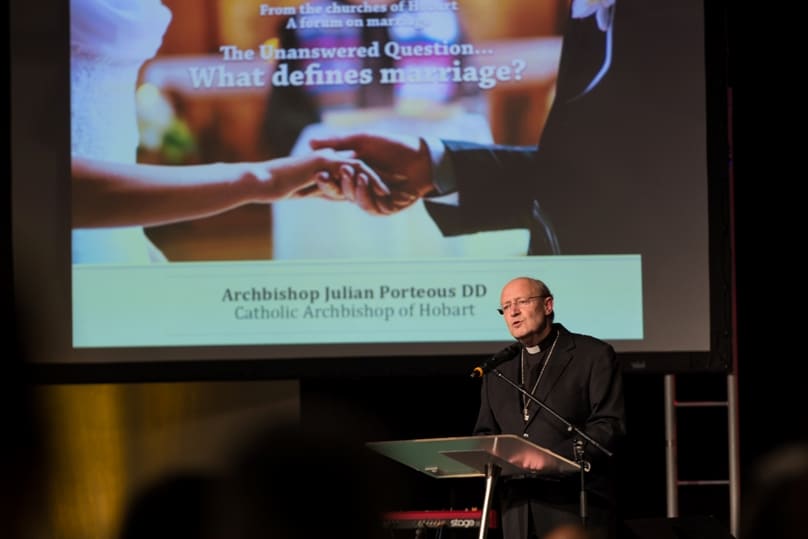The art of debate
The saying ‘truth is the first casualty of war’ is certainly true as proven by the fallacious and misleading arguments used in the campaign to justify the Victorian government’s legislation making it illegal to recommend, support or carry out conversion practices designed “to change or suppress a person’s sexual orientation or gender identity”.
One argument involves employing hyperbole and exaggerated language.
In The Age newspaper Nathan Despott and Chris Csabs condemn conversion practices as “damaging – even life threatening” and argue religious groups are guilty of enacting rituals and enforcing dogma causing “catastrophic damage to LGBTQA+ people” leading to high rates of “suicidal ideation”.
In the government’s media release headed ‘Banning Cruel Conversion Practices For Good,’ conversion practices are condemned as “cruel and bigoted” and guilty of endorsing an ideology that “is flawed and wrong”.
A second strategy, associated with hyperbole, is employing emotive language.
“A third argumentative strategy involves only presenting one side of the debate.”
The government’s media release describes conversion practices as “degrading and dehumanising” and “deceptive and harmful”.
Those supporting the legislation argue that because any attempt to advise or counsel against transgenderism is destructive it must be made a criminal offence.
In The Age comment piece the authors attempt to elicit a sympathetic response by using words like “vulnerable” and “catastrophic damage” when describing LGBTQA+ individuals being forced to undergo what are seen as unacceptable conversion practices.
A third argumentative strategy involves only presenting one side of the debate.
Those supporting conversion legislation refuse to acknowledge the reality that the Church agrees “cruel and bigoted practices” are unacceptable.
As argued by Melbourne’s Archbishop Comensoli, there is definitely no place for “harmful and coercive practices that would damage human dignity”.

Distorting the discourse
The Australian Bishops’ 2015 Pastoral Letter, Don’t Mess With Marriage, makes the same point when arguing “the Catholic Church opposes all forms of unjust discrimination. We deplore injustices perpetrated upon people because of religion, sex, race, age etc”.
Such is the God-given inherent dignity of the person it’s wrong to characterise Catholic teachings any other way.
In a comment piece published in The Age newspaper titled ‘Debate on transgender issue has one thing missing,’ La Trobe University academic Dr Yves Rees employs a fourth technique, one that involves arguing that only those directly affected by a particular issue have the right to be involved in any discussion and debate.
In relation to conversion practices, Rees argues heteronormative people must be excluded as only transgender people have the right to be involved.
“Instead of arguing the merits of the case and presenting an argument based on logic, rationality and reason, Rees, based on neo-Marxist gender theory, argues that because society is inherently transphobic, allowing non-trans voices only further entrenches disadvantage.”
Drawing on politically correct identity politics, Rees argues that allowing non-trans people to contribute is a form of “trans erasure” where “cis voices become a deafening chorus that drawn out trans perspectives”.
Instead of arguing the merits of the case and presenting an argument based on logic, rationality and reason, Rees, based on neo-Marxist gender theory, argues that because society is inherently transphobic, allowing non-trans voices only further entrenches disadvantage.
Rees writes “Again and again, discourse about marginalised communities remains dominated by the instigators of that marginality”.
Generalising by making unsubstantiated claims represents yet another example of persuasive technique.

The reality of conversion legislation
In their comment piece, Despott and Csabs claim destructive “conversion ideology and informal practices delivered in faith communities continue to proliferate” without providing any evidence.
The claim that for decades so-called life-threatening conversion practices “have been flourishing in faith communities and religious organisations right under our noses” is also unsubstantiated.
The sixth example of a rhetorical device involves downplaying the seriousness of an issue or what is being proposed by suggesting it is not as extreme as claimed.
Defending the legislation against the criticism that it is draconian, supporters argue it is not as dire as suggested. For example, the claim is made that only those guilty of causing ‘serious injury’ will be liable to a fine or imprisonment.
“Religious figures are especially targeted with the legislation stating that it is an offence to carry out ‘a religious practice, including but not limited to, a prayer based practice’.”
Conveniently ignored is the legislation’s clause 11.1 that states “A person (A) commits an offence if: 1. A intentionally engages in a change or suppression practice directed towards another person (B); and (b) the change or suppression practice causes injury to B; and (c) A is negligent as to whether engaging in the change or suppression practice will cause injury to B”.
If the legislation is passed anyone counselling, advising or being involved in what are defined as illegal conversion practices considered to have caused, or are likely to cause, both serious injury and injury will be at risk.
Even a doctor, health worker or child psychologist who gives “a person a referral” is liable to a fine or imprisonment.
Religious figures are especially targeted with the legislation stating that it is an offence to carry out “a religious practice, including but not limited to, a prayer based practice”.
Parents who seek counsel or advice on behalf of their children are also targeted.
Related Articles:

